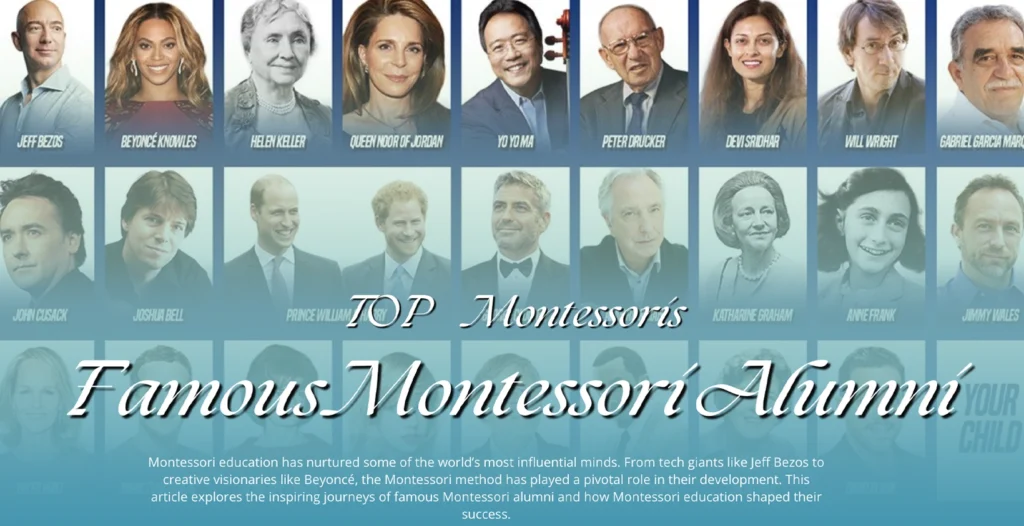Did you know that some of the world’s most successful entrepreneurs, artists, and leaders once attended Montessori schools? From famous Montessori alumni like Jeff Bezos and Julia Child to global superstars like Beyoncé, Montessori education has helped shape many of the most innovative and accomplished minds of our time.
Der Montessori method encourages children to think, be creative, and learn independently. By focusing on hands-on learning and self-motivation, Montessori helps develop confidence and a love for learning that stays with students for life.
In this article, we’ll dive into the stories of successful, famous Montessori alumni and explore how the Montessori approach helped them achieve greatness. You’ll learn about Montessori graduates like Larry Page and Sergey Brin, who co-founded Google, and Beyoncé, whose creativity and confidence were shaped by Montessori principles.
Join us as we examine how Montessori-Pädagogik influenced the paths of these legendary figures and how the principles of Montessori continue to inspire famous Montessori students worldwide. You may be inspired to see the potential of this unique method for the next generation of great thinkers, leaders, and creators.
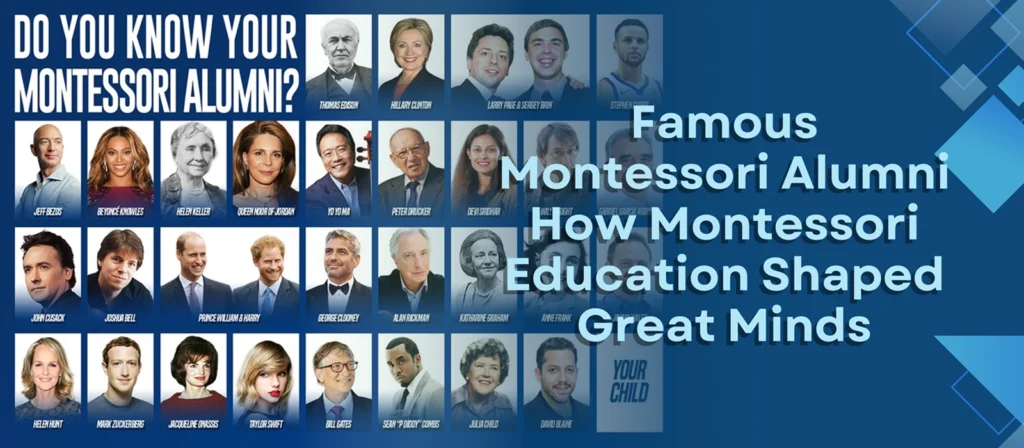
Understanding the Montessori-Methode
Famous Montessori alums often credit their success to the Montessori approach, a unique educational system developed by Dr. Maria Montessori. Unlike traditional education models, Montessori focuses on child-led learning, where students are encouraged to explore topics that interest them at their own pace. This method prioritizes independence, creativity, and hands-on learning, allowing children to grow academically, emotionally, and socially.
The Montessori method is grounded in the belief that children learn best in an environment that fosters curiosity and critical thinking. Through interactive lessons, children are given the tools to become lifelong learners. Unsurprisingly, many famous Montessori alumni have become leaders in their respective fields, as the Montessori environment shapes inquisitive, self-sufficient, and motivated individuals.
How did Montessori impact education?
Montessori education has profoundly impacted how we approach learning by challenging traditional, high-pressure schooling methods. Unlike conventional classrooms focusing on grades, tests, and rigid curriculums, Montessori provides a more flexible and individualized approach to education.
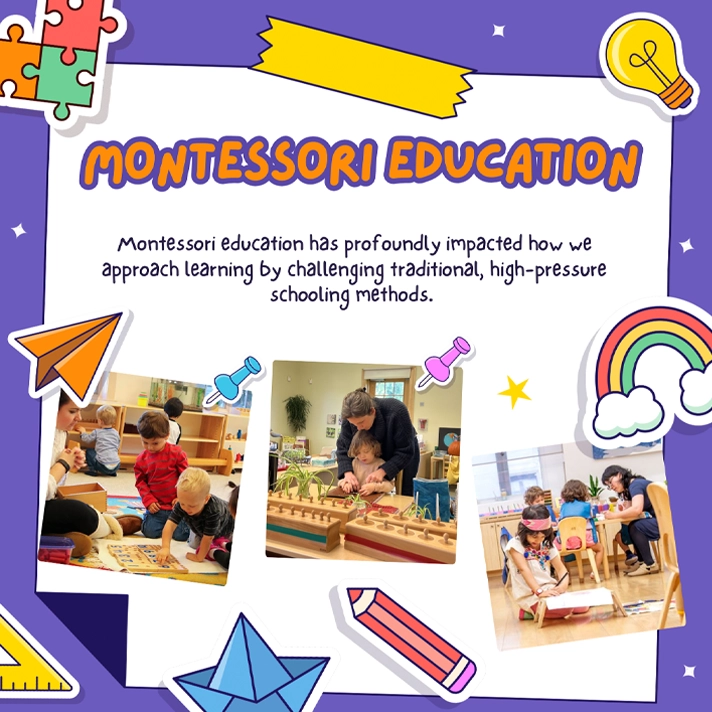
At the heart of Montessori education is the idea that children should have access to age-appropriate learning tools that cater to their developmental needs. This allows students to learn at their own pace, explore topics of interest, and take responsibility for their learning. By emphasizing self-directed work, Montessori education fosters independence and a sense of ownership over one’s educational journey.
In addition, Montessori-Klassenzimmer promote collaborative learning, where students interact and work together to solve problems, share ideas, and learn from one another. This collaboration enhances social skills and helps children develop a sense of community and empathy. The emphasis on intrinsic motivation—learning for curiosity and personal growth—replaces the external pressures of grades and tests, often associated with stress and anxiety in traditional education systems.
Montessori’s focus on the whole child—nurturing emotional, social, cognitive, and physical development—has reshaped how educators view the learning process. It encourages the development of critical thinking, creativity, and problem-solving from an early age, skills that are essential in today’s rapidly changing world. By allowing children the freedom to explore and choose their work, Montessori education creates an environment where learning is a lifelong pursuit, not just a means to an end.

Receive a free catalog and custom layout to help you design your ideal classroom easily.
Key Principles of Montessori-Erziehung
When discussing successful Montessori graduates, it’s essential to understand the core principles that make the Montessori method unique. Montessori education is built around several fundamental concepts supporting the child’s development. These principles foster independent, creative, and confident learners and are evident in the educational experiences of famous Montessori alumni. Here are the seven key principles of Montessori education:
1. Free Choice
Montessori graduates can choose their activities in a Montessori classroom, which encourages independence and self-motivation. This freedom allows students to take ownership of their learning process and builds decision-making skills to serve them throughout their academic and professional lives. Famous Montessori alumni often cite the ability to pursue their interests as a key factor in their success.
2. Teacher Guidance
While Montessori-Pädagogik emphasizes self-directed learning, teachers act as guides rather than traditional instructors. This personalized guidance ensures that each student receives tailored support based on their needs. For successful Montessori graduates, this approach allows them to flourish independently while still benefiting from the expertise of their teachers when needed.
3. Interest
Famous Montessori alumni often attribute their success to the fact that Montessori education is built around fostering natural curiosity. Students are encouraged to explore topics they are passionate about, which enhances their intrinsic motivation to learn. By focusing on interest-driven learning, Montessori creates lifelong learners who continue to develop their skills and creativity beyond the classroom.
4. Order
Order is a vital principle in Montessori education that helps students develop a sense of responsibility and discipline. In a structured environment, Montessori graduates learn to organize their work and maintain focus, which often plays a crucial role in their professional lives. The orderly classroom layout also creates a safe, calm space for creative thinking and problem-solving.
5. Context
Montessori education connects learning to real-world contexts, making education relevant and practical. For successful Montessori graduates, this principle promotes problem-solving skills and critical thinking. The connection between classroom lessons and real-life situations equips them with valuable knowledge applicable to their careers and personal growth.
6. Movement
Movement is essential to Montessori education, as physical activity is encouraged alongside intellectual learning. Montessori graduates benefit from the ability to move freely, which enhances their focus and cognitive development. This principle promotes a balance between mental and physical well-being, contributing to famous Montessori alumni’s success and overall growth.
7. Learning from Peers
Collaboration and peer learning are integral parts of the Montessori approach. Montessori students develop social skills and empathy by interacting with classmates and learning from each other. Fostered in a Montessori environment, these qualities become vital for the professional success of famous Montessori graduates, who are often known for working well in teams and understanding diverse perspectives.
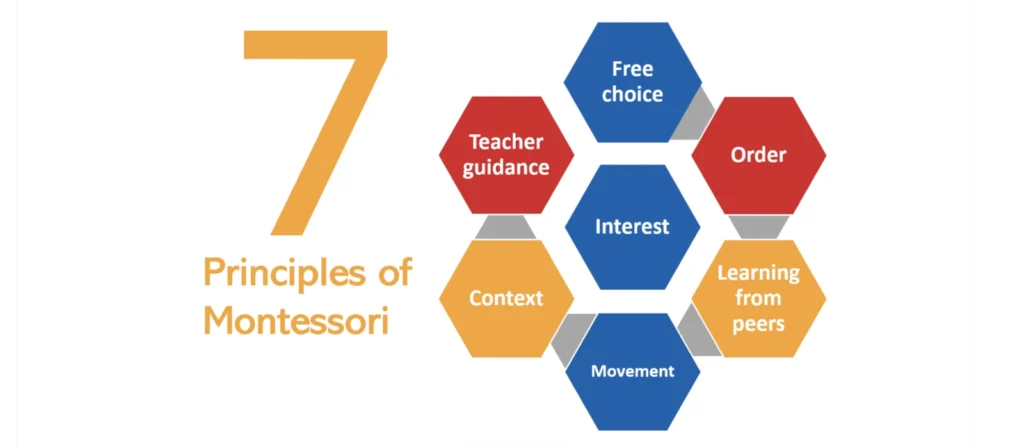
Montessori Education vs. Traditional Education
While both Montessori and traditional education aim to provide children with a foundation for success, their approaches are fundamentally different. Famous Montessori alumni often highlight how the Montessori method shaped their approach to problem-solving, creativity, and leadership, something they may not have experienced in a traditional classroom.
In traditional education systems, children typically follow a curriculum with fixed schedules and methods. Teachers provide direct instruction, and students are often assessed through standardized testing. In contrast, Montessori focuses on student-driven exploration, where children learn by doing. Montessori classrooms are designed to allow students to make choices, think independently, and collaborate with peers.
For successful Montessori graduates, this freedom to explore and self-direct learning is key to fostering innovation and critical thinking. This approach contrasts with traditional education’s focus on memorization and standardized outcomes.
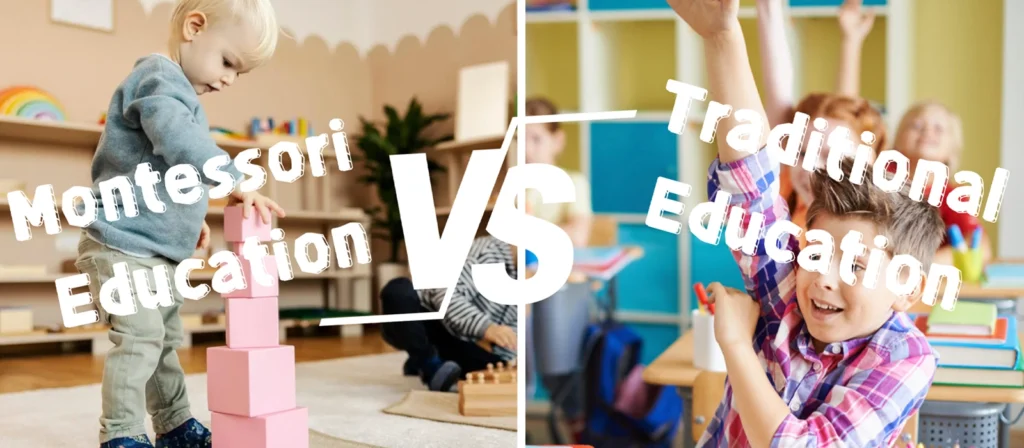
Famous Montessori Alumni: Their Stories of Success
Famous Montessori alumni come from various backgrounds, from entrepreneurs to entertainers. All of them attribute their success to the Montessori method. Their stories highlight how the Montessori approach cultivated the skills and mindset that led them to become leaders and pioneers in their respective fields.
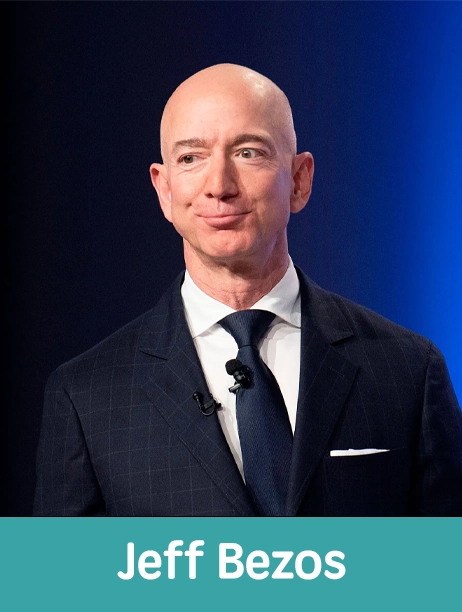
Jeff Bezos Montessori Education: A Visionary Entrepreneur
Jeff Bezos, the founder of Amazon, is one of the most well-known Montessori graduates. He often speaks about how the Montessori method shaped his entrepreneurial mindset. The independence and critical thinking skills fostered in his early years allowed him to think outside the box and disrupt the retail industry. Bezos credits his success to Montessori’s encouragement to pursue his interests and trust his instincts.
Bill Gates Montessori Education: A Tech Mogul’s Foundation
Another tech giant, Bill Gates, is a famous Montessori alumni who benefited from the self-directed learning style of the Montessori system. His curiosity was encouraged in a Montessori environment, allowing him to explore his passions for technology and innovation. Gates credits Montessori with teaching him how to think independently, a trait that has served him well throughout his career.
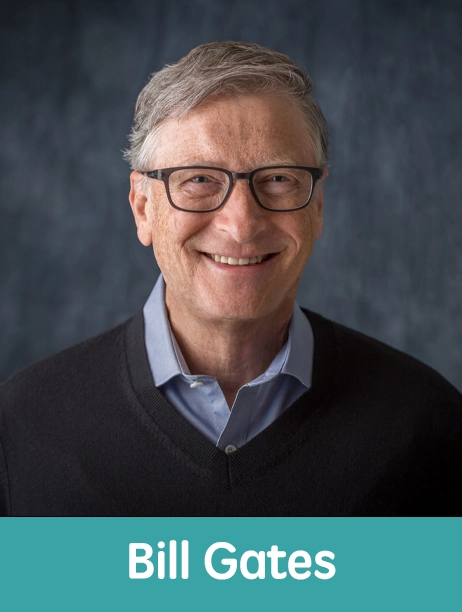
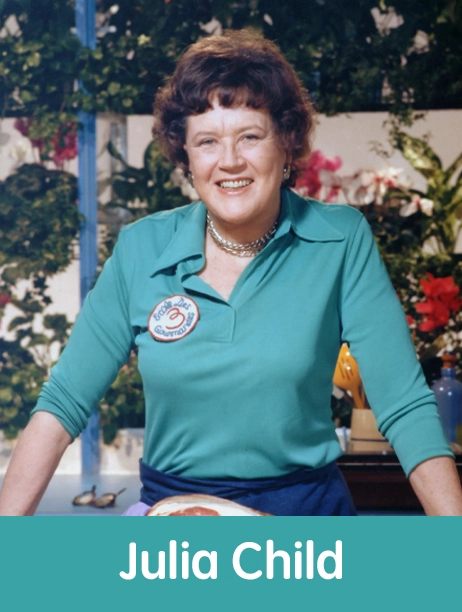
Julia Child Montessori Education: A Culinary Icon
Julia Child, the beloved television chef, is another successful Montessori graduate who used the Montessori method to fuel her creativity. The Montessori approach encouraged Julia to think outside the box and approach cooking with an open mind, allowing her to experiment and break free from conventional culinary norms. Her time in Montessori education fostered a deep sense of self-reliance and problem-solving that helped her persevere through challenges in her personal and professional life.
Larry Page Montessori Education: Co-founder of Google
Larry Page, co-founder of Google, is a famous Montessori alumni whose early education greatly influenced his problem-solving approach. The self-directed learning environment encouraged him to ask questions, challenge assumptions, and experiment with new ideas—skills essential for innovation and creativity in the tech world, contributing to Google’s groundbreaking success.
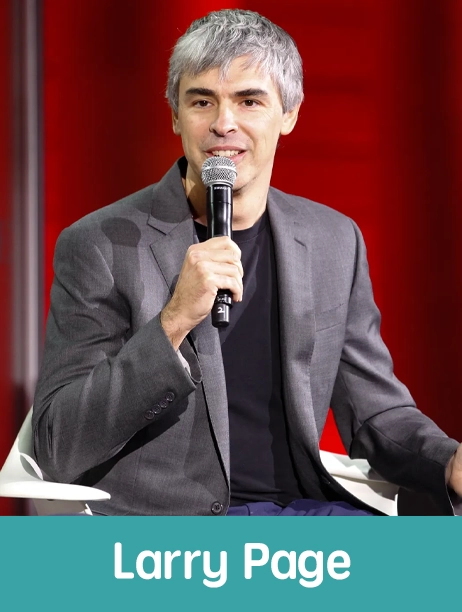

Sergey Brin Montessori Education: Pioneering the Digital Age
Sergey Brin, the other co-founder of Google, shares similar sentiments. Brin often discusses how Montessori education helped develop his inquisitive nature and problem-solving abilities, which have been key to his success in shaping the digital landscape. The Montessori environment encouraged Brin to think independently and approach challenges creatively, skills instrumental in his work on Google’s groundbreaking technologies.
Gabrielle Union Montessori Education: Actress and Advocate
Gabrielle Union, the actress and advocate, credits her Montessori education for teaching her independence and resilience. Union’s confidence and ability to stand up for what she believes in were nurtured by the Montessori principles of self-respect and individual freedom.


Elon Musk Montessori Education: Innovator and Visionary
Elon Musk, the CEO of Tesla and SpaceX, is another famous Montessori alumni who speaks highly of Montessori’s impact on his early years. Musk’s curiosity and relentless pursuit of innovation were encouraged in a Montessori environment, where he could pursue his interests and think critically about the future. The Montessori method allowed him the freedom to explore complex ideas from a young age, helping him develop the problem-solving skills and visionary mindset that have driven his success in revolutionizing industries.
Steph Curry Montessori Education: Basketball Superstar
Stephen Curry, the NBA player widely regarded as one of the greatest shooters in basketball history, is another successful Montessori graduate. His time in Montessori classrooms instilled a sense of discipline, patience, and a strong work ethic—traits that have served him well on the basketball court.

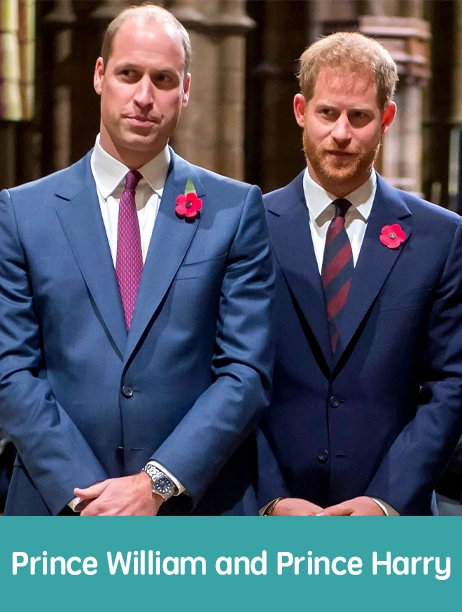
Prince William and Prince Harry: Royals with a Montessori Foundation
Both Prince William and Prince Harry attended Montessori schools in their early years. Their upbringing in this unique educational environment helped shape their personalities and leadership qualities, as they both continue to make significant contributions to charitable causes.

Receive a free catalog and custom layout to help you design your ideal classroom easily.
What Do Famous Montessori Alumni Have in Common?
Several key traits consistently emerge across the diverse fields in which famous Montessori alumni have excelled. These shared characteristics, nurtured through Montessori education, set them apart and contributed to their success.
Independent Thinking
Montessori graduates are known for their ability to think for themselves. Montessori education fosters self-directed learning, allowing children to explore their interests and make decisions independently. This environment helps develop a strong sense of self-reliance, which plays a key role in their success as adults.
Curiosity and Lifelong Learning
Montessori education instills a deep sense of curiosity in students. The method encourages them to ask questions, investigate, and explore the world around them. This curiosity doesn’t fade after graduation; it often stays with Montessori alumni for life. Their eagerness to learn and grow constantly drives them to push boundaries and innovate in their careers.
Creative Problem-Solving
Creativity is a cornerstone of the Montessori method. Children are given the tools and freedom to approach problems in unique ways. As a result, famous Montessori alumni are often praised for their ability to think outside the box and innovate in unconventional ways. They don’t just follow traditional paths—they create their own.
Confidence and Responsibility
One of the defining features of successful Montessori graduates is their sense of confidence in decision-making. Montessori education promotes responsibility by encouraging children to take ownership of their learning process. This sense of accountability extends into adulthood, where Montessori alumni tend to approach challenges with assurance and resilience.
Collaboration and Empathy
While Montessori education promotes independence, it also emphasizes collaboration. Students learn to work together, share ideas, and communicate effectively. This focus on social-emotional development helps them build strong interpersonal skills and empathy, essential for effective leadership and teamwork in the real world.
Adaptability
The Montessori environment nurtures adaptability, teaching children to navigate different situations and embrace change. Many famous Montessori alumni demonstrate this ability to adjust and thrive in diverse environments in their careers, whether they are leaders in tech, the arts, or business.
The Impact of Montessori Education on Career Success
The impact of Montessori education on career success is profound and far-reaching, particularly for successful Montessori graduates who have shaped industries and changed the world. The core principles of Montessori — independence, curiosity, and creative problem-solving — form the foundation for individuals who achieve remarkable success.
Fostering Self-Confidence and Leadership
One key element contributing to career success for Montessori alumni is the development of self-confidence. From a young age, Montessori students are encouraged to make choices for themselves, whether selecting their activities or determining how to approach a project. This autonomy fosters a sense of ownership over their decisions and builds confidence in their abilities.
As these individuals grow older, this confidence translates into strong leadership qualities. Whether in business, technology, or the arts, famous Montessori alumni often find themselves in leadership positions. They are unafraid to take initiative, set bold goals, and take calculated risks, which are crucial to career success. This foundation of self-confidence is especially evident in tech moguls like Larry Page and Sergey Brin (Google’s co-founders) or entrepreneurs like Jeff Bezos, who pioneered Amazon. Their ability to make bold decisions and lead innovative ventures can be traced back to the confidence instilled in them by their Montessori education.
Critical Thinking and Problem Solving
Another factor that significantly impacts the careers of Montessori graduates is the emphasis on critical thinking. Montessori education teaches children to question, explore, and think deeply about the world around them. This develops an analytical mindset crucial in navigating the complexities of today’s fast-paced world.
Famous Montessori alumni like Elon Musk and Bill Gates have continually applied critical thinking to solve some of the world’s most pressing problems. Musk’s ventures with SpaceX and Tesla have redefined entire industries, while Gates revolutionized software with Microsoft. Both pioneers have continuously applied critical thinking innovatively, seeking Lösungen to problems that others deemed unsolvable.
In business, critical thinking is often the difference between success and failure. Many Montessori graduates are renowned for their ability to identify opportunities, evaluate risks, and find creative solutions to challenges. Whether running global tech companies or launching cutting-edge startups, their education has equipped them with the mental tools to tackle complex problems and lead with foresight.
Creativity and Independent Thinking
Montessori education fosters creativity and independent thinking by emphasizing hands-on learning and self-directed exploration. Unlike traditional education systems, Montessori encourages children to make their own choices and follow their curiosity, enabling them to think independently, solve problems creatively, and approach tasks with an open mind.
This approach promotes critical and exploratory thinking, allowing students to find innovative solutions. The freedom to explore and learn actively in a Montessori environment nurtures flexibility and creative problem-solving, laying a strong foundation for future achievements.
Resilience and Adaptability
The Montessori approach cultivates resilience and adaptability, two crucial traits for career success in today’s ever-evolving world. In Montessori classrooms, children are not shielded from failure; instead, they are taught to view challenges as opportunities for growth. By navigating obstacles early in life, Montessori graduates learn to bounce back from setbacks and persevere in adversity.
This ability to adapt and stay resilient in difficult situations is essential for long-term career success. Many famous Montessori alumni, from Jeff Bezos to Gabrielle Union, have faced personal and professional challenges throughout their careers. However, their Montessori foundation allowed them to overcome these obstacles and keep moving forward, demonstrating the power of resilience.

Receive a free catalog and custom layout to help you design your ideal classroom easily.
Conclusion: The Lasting Influence of Montessori Education on Great Minds
The lasting impact of Montessori education is evident when we look at the success stories of famous Montessori alumni like Larry Page, Sergey Brin, and Beyoncé. Montessori gives children the tools to think critically, develop creatively, and confidently pursue their passions. It’s no wonder many successful Montessori graduates have become innovators, leaders, and game-changers in their fields. Montessori education remains one of the most influential and effective methods for those seeking an educational approach that nurtures independence, creativity, and critical thinking.

